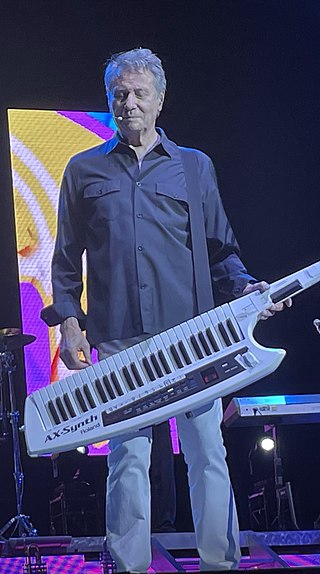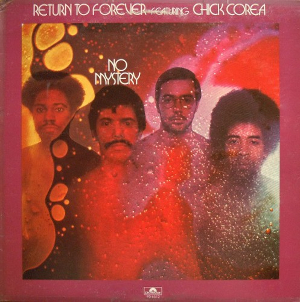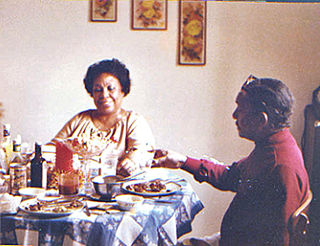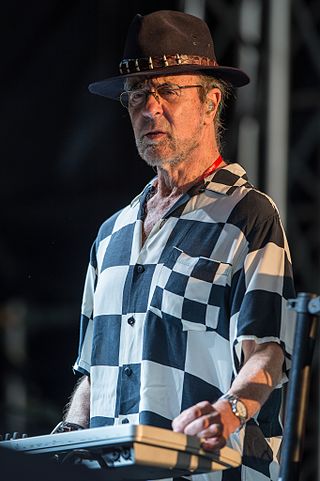Related Research Articles
Jerome Richardson was an American jazz musician and woodwind player. He is cited as playing one of the earliest jazz flute recordings with his work on the 1949 Quincy Jones arranged song "Kingfish".

An electric piano is a musical instrument that has a piano-style musical keyboard, where sound is produced by means of mechanical hammers striking metal strings or reeds or wire tines, which leads to vibrations which are then converted into electrical signals by pickups. The pickups are connected to an instrument amplifier and loudspeaker to reinforce the sound sufficiently for the performer and audience to hear. Unlike a synthesizer, the electric piano is not an electronic instrument. Instead, it is an electro-mechanical instrument. Some early electric pianos used lengths of wire to produce the tone, like a traditional piano. Smaller electric pianos used short slivers of steel to produce the tone. The earliest electric pianos were invented in the late 1920s; the 1929 Neo-Bechstein electric grand piano was among the first. Probably the earliest stringless model was Lloyd Loar's Vivi-Tone Clavier. A few other noteworthy producers of electric pianos include Baldwin Piano and Organ Company, and the Wurlitzer Company.

KORG Inc., founded as Keio Electronic Laboratories, is a Japanese multinational corporation that manufactures electronic musical instruments, audio processors and guitar pedals, recording equipment, and electronic tuners. Under the Vox brand name, they also manufacture guitar amplifiers and electric guitars.

Lawrence Brown was an American jazz trombonist from California best remembered for his work with the Duke Ellington orchestra. He was a session musician throughout his career, and also recorded albums under his own name.

Callen Radcliffe Tjader Jr. was an American Latin Jazz musician, often described as the most successful non-Latino Latin musician. He explored other jazz idioms, especially small group modern jazz, even as he continued to perform music of Africa, the Caribbean and Latin America.

Kenneth Earl Burrell is an American jazz guitarist known for his work on numerous top jazz labels: Prestige, Blue Note, Verve, CTI, Muse, and Concord. His collaborations with Jimmy Smith were notable, and produced the 1965 Billboard Top Twenty hit Verve album Organ Grinder Swing. He has cited jazz guitarists Charlie Christian, Oscar Moore, and Django Reinhardt as influences, along with blues guitarists T-Bone Walker and Muddy Waters.
Edwin LeMar "Buddy" Cole was a jazz pianist, organist, orchestra leader, and composer. He played behind a number of pop singers, including Rosemary Clooney and Bing Crosby.

Contemporary Records was a jazz record company and label founded by Lester Koenig in Los Angeles in 1951. Contemporary produced music from a variety of jazz styles and players.

Stephen Kendall Gadd is an American drummer, percussionist, and session musician. Gadd is one of the best-known and highly regarded session and studio drummers in the industry, recognized by his induction into the Modern Drummer Hall of Fame in 1984. Gadd's performances on Paul Simon's "50 Ways to Leave Your Lover" (1976) and "Late in the Evening", Herbie Mann's "Hi-jack" (1975) and Steely Dan's "Aja" (1977) are examples of his style. He has worked with other popular musicians from many genres including Simon & Garfunkel, James Taylor, Chick Corea, Chuck Mangione, Eric Clapton and Michel Petrucciani.

Robert William Lamm is an American musician and a founding member of the rock band Chicago. He is best known for his songwriting, vocals, and keyboard melodies, most significantly on the band's debut studio album, Chicago Transit Authority(1969). Lamm wrote many of the band's biggest hits, including "Questions 67 & 68", "Does Anybody Really Know What Time It Is?", "Beginnings", "25 or 6 to 4", "Saturday in the Park", "Dialogue " and "Harry Truman". Lamm is one of three founding members still performing with the group.

No Mystery (1975) is a studio album by jazz-rock fusion band Return to Forever, and the second featuring the quartet of Chick Corea, guitarist Al Di Meola, bassist Stanley Clarke and drummer Lenny White.

Where Have I Known You Before is a studio album by Return to Forever, the first featuring guitarist Al Di Meola, and the second since leader Chick Corea switched to mostly electric instrumentation, playing music heavily influenced by progressive rock, funk and classical.

Tom Coster is an American keyboardist, composer, and longtime backing musician for Carlos Santana.

My Spanish Heart is a studio album by Chick Corea, recorded and released in 1976. Prominent guest musicians include Corea’s Return to Forever bandmate Stanley Clarke on basses, violinist Jean-Luc Ponty, drummers Steve Gadd and Narada Michael Walden and Corea’s wife Gayle Moran on vocals.

Gerald Foster Wiggins was an American jazz pianist and organist.

Manfred Sepse Lubowitz, known professionally as Manfred Mann, is a South African-born musician, residing in the UK since 1961. He is best known as a founding member of the bands Manfred Mann, Manfred Mann Chapter Three and Manfred Mann's Earth Band.
Joseph Christopher Columbus Morris, better known as Crazy Chris Columbo or just Chris Columbo, was an American jazz drummer. He was sometimes credited as Joe Morris on record, though he is no relation to free jazz guitarist Joe Morris or trumpeter Joe Morris.

An organist is a musician who plays any type of organ. An organist may play solo organ works, play with an ensemble or orchestra, or accompany one or more singers or instrumental soloists. In addition, an organist may accompany congregational hymn-singing and play liturgical music.
The timeline of music technology provides the major dates in the history of electric music technologies inventions from the 1800s to the early 1900s and electronic and digital music technologies from 1874 to the 2010s.

Electric music technology refers to musical instruments and recording devices that use electrical circuits, which are often combined with mechanical technologies. Examples of electric musical instruments include the electro-mechanical electric piano, the electric guitar, the electro-mechanical Hammond organ and the electric bass. All of these electric instruments do not produce a sound that is audible by the performer or audience in a performance setting unless they are connected to instrument amplifiers and loudspeaker cabinets, which made them sound loud enough for performers and the audience to hear. Amplifiers and loudspeakers are separate from the instrument in the case of the electric guitar, electric bass and some electric organs and most electric pianos. Some electric organs and electric pianos include the amplifier and speaker cabinet within the main housing for the instrument.
References
- ↑ Joseph F. Clarke (1977). Pseudonyms. BCA. p. 155.
- ↑ John Steuart Wilson (1959). The collector's jazz: modern. Lippincott.
- ↑ David H. Rosenthal (9 September 1993). Hard Bop: Jazz and Black Music 1955-1965 . Oxford University Press. pp. 110–. ISBN 978-0-19-535899-5.
- ↑ Keyboard. 15. GPI Publications: 46. 1988.
{{cite journal}}: Missing or empty|title=(help)